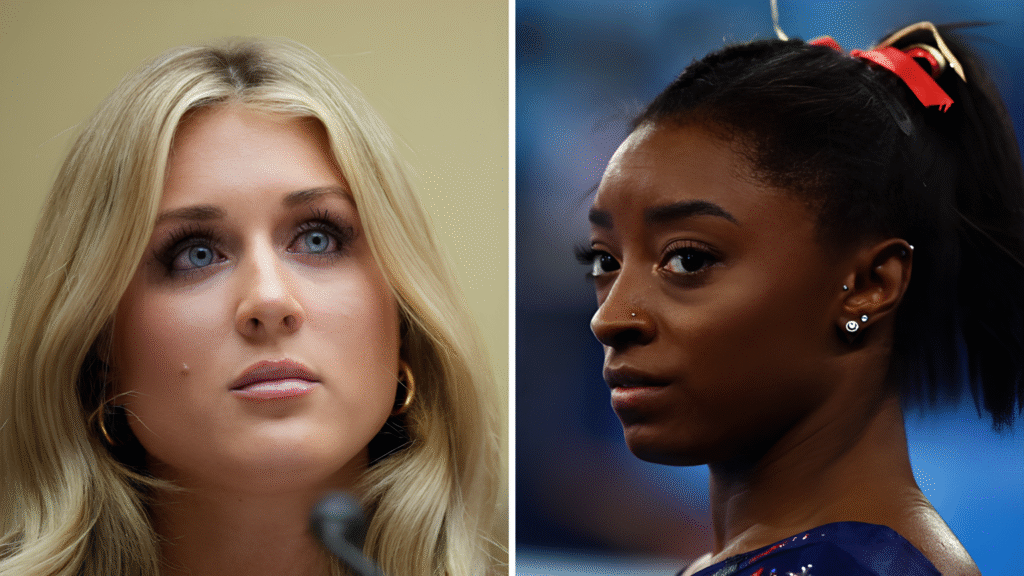Simone Biles vs. Riley Gaines: Inside the Explosive Debate That’s Dividing America’s Sports World in 2025
Introduction
In 2025, the sports world is witnessing a significant and contentious debate surrounding the participation of transgender athletes in women’s sports. Central to this discussion are two prominent figures: Olympic gymnast Simone Biles, renowned for her groundbreaking achievements and advocacy for mental health, and swimmer Riley Gaines, who has emerged as a vocal critic of transgender participation in female sports. This article delves into the nuances of this debate, exploring the implications for sports equality issues and the future of women’s athletics.

Main Development
The debate between Biles and Gaines encapsulates a broader national conversation about fairness, inclusivity, and the integrity of women’s sports. On one hand, Biles, a celebrated athlete and advocate for sports equality issues, emphasizes the importance of inclusion and the need for all athletes to have the opportunity to compete, regardless of gender identity. Her stance reflects a growing acceptance of transgender athletes in various sports, arguing that their participation does not undermine the achievements of cisgender women.
Conversely, Riley Gaines has taken a staunch position against the inclusion of transgender women in female sports categories. As a former NCAA swimmer, she argues that allowing transgender athletes to compete in women’s events creates an uneven playing field, compromising the integrity of women’s sports. Gaines has gained a significant following among those who share her concerns, framing her arguments around the need to protect the hard-earned rights and opportunities of female athletes.
This conflict has intensified as various sports organizations, including the NCAA and the International Olympic Committee, grapple with the policies surrounding transgender participation. In 2025, these organizations face mounting pressure to create regulations that balance inclusion with fairness, leading to a patchwork of rules that vary widely across different sports.
Analysis and Benefits
The implications of the Biles-Gaines debate extend far beyond individual athletes; they touch upon fundamental questions about identity, fairness, and the future of women’s sports. Supporters of Biles argue that her advocacy for transgender athletes is essential in fostering a more inclusive society. They contend that sports should reflect the diversity of the population and that excluding transgender individuals from competition is a form of discrimination that undermines the very principles of equality that sports embody.
In contrast, Gaines’s supporters maintain that the physiological advantages that transgender women may possess create an inherent unfairness in competition. They assert that preserving the integrity of women’s sports is paramount, highlighting instances where female athletes have been outperformed by transgender competitors. This perspective raises essential questions about the definition of fairness in athletics and the criteria by which eligibility should be determined.
As the debate unfolds, both sides present valid points that warrant consideration. On one hand, the benefits of inclusion in sports can lead to greater social acceptance and visibility for transgender individuals. On the other hand, the protection of women’s sports and ensuring fair competition remains a priority for many who fear that the current trajectory may diminish the achievements of female athletes.
Practical Implementation
To navigate the complexities of this debate, sports organizations must engage in a comprehensive review of their policies regarding transgender athletes. This includes conducting research into the physiological differences that may exist, understanding the impact of hormone therapy on performance, and considering the voices of athletes from all backgrounds. A transparent and inclusive dialogue is essential to address women’s sports controversy and ensure that all athletes can compete fairly.
One potential solution involves the establishment of clear guidelines based on scientific evidence, which could help to create a more equitable playing field. For example, implementing specific hormone level requirements for transgender women competing in female categories could address some concerns regarding fairness while still allowing for participation. Additionally, promoting education and awareness around sports equality issues can foster understanding and dialogue among athletes, coaches, and the broader public.
Engaging in community discussions and forums where athletes can share their experiences, concerns, and suggestions is crucial. This collaborative approach can help to bridge the gap between differing perspectives and find common ground in the pursuit of fair and inclusive sports environments.

FAQ
What are the main arguments for and against the inclusion of transgender athletes in women’s sports?
Proponents of inclusion argue that all athletes deserve the right to compete, emphasizing the importance of representation and acceptance. Opponents, like Riley Gaines, argue that allowing transgender women to compete in women’s categories creates an unfair advantage and undermines the integrity of women’s sports.
How has Simone Biles contributed to the discussion on transgender athletes?
Simone Biles has utilized her platform to advocate for inclusivity in sports, supporting the participation of transgender athletes. She argues that sports should be a space for all individuals, regardless of their gender identity, and emphasizes the importance of mental health and acceptance in athletics.
What impact does the debate have on young female athletes?
The ongoing debate can create confusion and concern among young female athletes about their opportunities in sports. It highlights the need for constructive dialogue and clear policies to ensure that all athletes feel valued and protected in competitive environments.
Are there any existing policies regarding transgender athletes in major sports organizations?
Many major sports organizations, including the NCAA and the International Olympic Committee, are currently reviewing and updating their policies on transgender participation. These policies vary widely and often involve specific criteria related to hormone levels and competition categories.
What steps can sports organizations take to address this controversy?
Sports organizations can engage in research, develop clear and science-backed guidelines, and foster open discussions among athletes and stakeholders. Creating an inclusive environment that respects diverse perspectives while prioritizing fair competition is essential for navigating this complex issue.
Conclusion
The debate between Simone Biles and Riley Gaines represents a critical juncture in the ongoing discussion about sports equality issues and the future of women’s sports. As society grapples with the implications of inclusivity and fairness, the resolution of this debate will shape the landscape of athletics for years to come. By fostering dialogue and understanding, stakeholders can work toward solutions that respect the rights and opportunities of all athletes, ensuring that sports remain a platform for excellence and equality.







